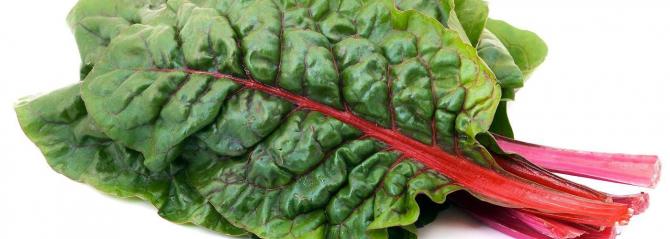
Swiss chard is one of the most impressive vegetables out there, as it has an extremely high nutrient-density. The range of antioxidants in Swiss chard nutrition can be seen both in its deeply colored green leaves and also in the reds, purples, and yellows of its vibrant, multicolored stalks and veins. Swiss chard nutrition benefits include its many forms of polyphenol, betalain and carotenoid antioxidants which are powerful at fighting free radical damage, inflammation, and disease development.
Some of the antioxidants found in Swiss chard include: carotenoids such as beta-carotene, lutein, and zeaxanthin which are crucial for eye health, and flavonoids like quercetin and kaempferol which act as antihistamines and reduce allergic reactions and inflammatory responses. (1) Swiss chard is also one of the best sources of betalains, water-soluble plant pigments that have a wide range of desirable biological activities, including antioxidant, anti-inflammatory, and anti-cancer properties. (2)
On top on this, Swiss chard packs an impressive amount of potassium, magnesium, calcium, copper, and even more vitamins and minerals. And with high levels of vitamin K, vitamin A, vitamin C, and many trace minerals, there's almost no health condition that Swiss chard can't help.
Swiss chard nutrition is especially well known for having special chemical properties that make it extremely useful for preventing and treating diabetes. Swiss chard helps the blood sugar-regulating system within the body by helping to regulate activity of the enzyme called alpha-glucosidase, aiding in the slow release of glucose (sugar) into the blood stream.
Swiss Chard Nutrition Facts
Swiss chard is a member of the chenopod plant family, which includes other beneficial foods such as beets, spinach, and quinoa. Chenopod vegetables have been used for their medicinal purposes for centuries in traditional forms of folk medicine.
Nutrition experts believe that Swiss chard and other chenopod vegetables, like beets, can be a highly renewable and cheap source of nutrients for many populations. Swiss chard nutrition is so prized because not only can the plant can be grown in a range of soils and require little light and water, but it also provides such a high amount of nutrients. (3)
In fact, Swiss chard is now even being grown in space! Swiss chard is among the first crops being grown in planetary space stations for astronauts and was chosen due to its extremely valuable nutrient profile, as well as its ease of being harvested. (4)
One cup of cooked Swiss chard contains: (5)
Just 35 calories
3 grams of protein
4 grams of fiber
7 grams of carbohydrates
572 mg Vitamin K (636%)
306 mg Vitamin A (60%)
5 mg Vitamin C (42%)
150 mg Magnesium (38%)
.28 mg Copper (32%)
.58 mg Manganese (29%)
961 mg Potassium (27%)
89 mg Vitamin E (22%)
95 mg Iron (22%)
50 mg Choline (12%)
.15 mg Vitamin B2 (12%)
102 mg Calcium (10%)
Swiss Chard Health Benefits
1. High in Antioxidants
Swiss chard is packed with antioxidants that help reduce free radical damage within the body and literally slow the aging process. In fact Swiss chard is thought to contain up to 13 different types of polyphenol antioxidants alone. In 2004, researchers were also able to identify nineteen different types of betaxanthin antioxidants in Swiss chard, as well as nine types of betacyanins among the different varieties of chard. (6)
One of the primary flavonoid antioxidants found in the leaves of chard is a flavonoid called syringic acid. Syringic acid is known for regulating blood sugar levels, making it the object of much research over recent years as diabetes diagnosis rates have continued to increase. (7) Something else noteworthy about Swiss chard nutrition? It's anti-aging antioxidants also help to prevent cancer, heart disease, eye and skin disorders, neurodegenerative disorders, and much more.
2. Protects Heart Health
The range of antioxidants found in Swiss chard benefits heart health in multiple ways by lowering levels of inflammation, since Swiss chard can help turn off pro-inflammatory reactions. These reactions can worsen high cholesterol, high blood pressure, and increase the risk of suffering from a heart attack, stroke, or another form of cardiovascular disease.
Swiss chard is considered an anti-hypertensive vegetable because it contains many trace minerals that are crucial for proper circulation, blood vessel health, and heart beat regulation. (8) Magnesium, potassium, copper, iron and calcium for example are all minerals found in Swiss chard that work together to aid in red blood cell formation, nerve signaling, blood vessel constriction and help control blood pressure levels.
3. Fights Cancer
A key benefit to Swiss chard nutrition is that its leafy greens contain many cancer fighting antioxidants and phytonutrients - in fact it is one of the most antioxidant-rich foods on the planet! Some of the most notable include beta carotene, apigenin flavonoids like vitexin, quercetin, numerous carotenoids, and a range of betalains.
Studies show that Swiss chard extract has the ability to inhibit proliferation of human cancer cells and to stabilize fibroblasts, which are important cells that make up connective tissue. (9) The antioxidants found in Swiss chard are associated with the ability to stop growth of cancer cells from breast, colon, prostate, ovarian, endometrial, and lung tumors.
Because of Swiss chard's powerful ability to fight cancer, researchers have begun testing the seeds of Swiss chard, in addition to extracts taken from Swiss chard leaves, to identify if they can be used as a natural chemo-protective treatment.
4. Helps Prevent Diabetes
Swiss chard nutrition has been praised for making the leafy green a powerful blood sugar regulator. Swiss chard has nutrient properties that are believed to be one of the best vegetables for people with pre-diabetes, diabetes, or other forms of metabolic syndrome or insulin resistance. (10) Certain flavonoids found in Swiss chard help to inhibit activity of an enzyme called alpha-glucosidase which breaks down carbohydrates into simple sugars, therefore it makes it easier to maintain a steadier blood sugar level. This makes Swiss chard an antihypoglycemic vegetable and one of the best foods to incorporate into a blood sugar-stabilizing diet.
Another unique benefit of Swiss chard is its effect on pancreatic beta cells. Beta cells in the pancreas are responsible for producing insulin, the hormone that controls blood sugar. It's believed that Swiss chard may help pancreatic beta cells to regenerate and therefore helps to control insulin production more effectively.
In addition to its special phytonutrient abilities, Swiss chard contains a very good amount of dietary fiber, with almost 4 grams per one-cup serving of cooked chard. Fiber helps to slow down the release of sugar in the blood stream following a meal, in addition to having heart health and digestive health benefits.
5. Maintains Bone Health
Swiss chard is a great source of vitamin K and calcium, two key nutrients needed to maintain a strong skeletal structure. 99% of the body's calcium is stored within the bones, where it is needed to help maintain bone strength, mineral density, and to prevent weak bones that can lead to fractures. (11)
Just one cup of cooked Swiss chard provides a whopping 636% of your daily vitamin K needs! Vitamin K is an essential nutrient for bone health - and reduces fracture rates because it activates osteocalcin, the major non-collagen protein that helps form bones. (12) Together this nutrient found in Swiss chard helps modulate bone metabolism, aids in bone growth, and protects the body from bone mineral loss common in the aging process.
6. Improves Digestion
Swiss chard benefits digestive health by helping to reduce inflammation within the digestive tract and by regulating bowel movements that draw toxins out of the body. Swiss chard's phytonutrient betalains are excellent for supporting detoxification by acting as anti-inflammatories and antioxidants within the gut.
Swiss chard also contains about 4 grams of dietary fiber in just one cup of cooked greens, which helps to regulate blood sugar levels, improves colon and digestive health, prevents constipation and diarrhea,
 Order Book
Order Book and also helps you to feel fuller in the process.
7. Helps Maintain Healthy Brain Function
Many studies show that regularly eating vegetables with high betalain levels provides significant protection against certain oxidative stress-related disorders, which includes neuro-degenerative diseases. (13) Betalains and the other antioxidants found in Swiss chard defend brain cells from mutation, protect from DNA damage, reduce free radicals, and lower the risk of disorders including Alzheimer's and Parkinson's disease.
8. Protects Eye Health
Yet another benefit of Swiss chard nutrition is that this vegetable is an excellent source of carotenoids called lutein and zeaxanthin, which have been getting significant research attention lately due to their ability to protect vision and ward off eye disorders.
These carotenoids are able to protect the retina, cornea, and defend against age-related disorders of the eyes including macular degeneration, glaucoma, night blindness and cataracts. They do this by absorbing damaging blue light that enters the eye before it can cause disturbances to the retina. (14)
Betalains found in Swiss chard also protect the health of the nervous system, including specialized nerve signaling which is crucial for the communication between the eyes and brain.
9. Benefits Nerve and Muscle Function
Swiss chard provides a high amount of magnesium, potassium, calcium and other minerals that are crucial for muscle health and nervous system health. Swiss chard contains an impressive 38% about of your daily magnesium needs for every one-cup serving of cooked chard, which helps improve circulation and reduce muscle cramps and pain that can result from a magnesium deficiency. (15)
Swiss chard's high level of magnesium can also help prevent stress related symptoms that take a toll on the nervous system, including insomnia, mood disturbances, headaches, high blood pressure, and an increased risk for diabetes.
History of Swiss Chard
Swiss chard's name may be a bit misleading, because it actually isn't a plant that is native to Switzerland, but rather was "discovered" by a Swiss botanist in 1753.
Swiss chard, which has the scientific name Beta vulgaris, is actually native to regions in the Mediterranean, where it is still a very popular vegetable today. It's believed that Swiss chard has been included in the diets of Mediterranean populations for thousands of years. Even Greek philosopher Aristotle wrote about Swiss chard nutrition! Ancient Greek and Roman populations frequently grew and ate Swiss chard, already aware of its many healing properties.
Swiss chard has been used in folk medicine as a natural decongestant, allergy reliever, and pain reducer (likely because it reduced inflammation) for many years. Today Swiss chard goes by other names around the world such as silverbeet, sea beet, spinach beet, and crab beet, and in South Africa Swiss chard is actually called spinach.
How to Buy Swiss Chard
Swiss chard can usually be found in grocery stores available throughout the year, but technically its peak season is during the summer months from June through August. This is when you'll most likely find the best tasting, fresh Swiss chard at farmer's markets. It grows mostly in the Northern Hemisphere and is known to be an easy plant to grow, although it's very perishable once fully grown and ripe.
Swiss chard is a tall and sturdy leafy green vegetable that has a somewhat bitter and strong flavor, especially when eaten raw. Most people greatly prefer the taste of Swiss chard when its cooked - and combined with seasonings like salt or garlic.
Look for Swiss chard that has tall, vibrant leafy greens that do not have many signs of discoloration, wilting, or holes. The stalk should be thick and crunchy, and may come in colors other than green; for example, Swiss chard can commonly be found in shades of white, red, purple, yellow, or even be multicolored.
Once purchasing Swiss chard, do not wash the greens right away as this encourages them to wilt more quickly. Instead try putting them inside of a plastic bag and wrapping a damp paper towel around the stems which will keep in moisture and prolong its freshness. Try to use Swiss chard within 4-5 days of buying it. You can always cook the greens and freeze them for later, which will preserve the nutrients and make a great addition to soups, stews, or sauces down the road.
How to Cook Swiss Chard
You can take advantage of the benefits of Swiss chard nutrition by using it in recipes the same way many other greens are used- like kale, spinach, collard greens, or mustard greens. Cooking Swiss chard brings out a natural sweetness and decreases bitterness, making Swiss chard a great addition to a variety of hearty and savory recipes.
It's recommend that you try boiling Swiss chard or lightly sautéing it before eating it. This helps to decrease certain acids found in Swiss chard and to improve its taste and nutrient availability. You can do this by quickly boiling the leaves for only 2-3 minutes in an open pot (don't add a lid which will hinder the process a bit), or by sautéing them in a pan with some olive oil, stock, or coconut oil just until they are wilted.
Swiss Chard Recipes
Chard Greens Recipe
Here is a basic Swiss chard recipe that is healthy, delicious and easy to make.
Total Time: 80 minutes
Serves: 4-6
INGREDIENTS:
¼ cup coconut oil, melted
2 tablespoon minced garlic
5 cup chicken broth
5 bunches chard, trimmed and chopped
sea salt and black pepper to taste
1 tablespoon red pepper flakes
DIRECTIONS:
Heat the coconut oil in a large pot over medium high heat. Add garlic and sauté for 2-3 minutes. Pour in the chicken stock and simmer for 30 minutes covered.
Add the chard greens to the pot and turn the heat to medium high. Let the greens cook down for about 45 minutes, stirring occasionally.
Reduce heat to medium and season with salt and pepper. Cook until greens are tender. Drain greens and add in red pepper flakes.
Creamy Broccoli Soup Recipe
Try adding Swiss chard to this creamy broccoli soup, which is absolutely delicious and full of healthy fats from coconut oil, which help you to better absorb some of Swiss chard's fat-soluble nutrients better. Coconut oil has many health benefits and even aids in weight loss and helps to stimulate the metabolism, making this a nutrient-packed meal or side dish.
Total Time: 30 minutes
Serves: 2
INGREDIENTS:
2 tablespoons coconut oil
2 medium green onions, coarsely chopped
2 cloves garlic, minced
1 large head fresh broccoli, washed and chopped
1 tablespoon basil leaves, dried
2 cups chopped spinach, kale, turnip greens, collards or Swiss chard
2 quarts chicken broth
1 can coconut milk
1 teaspoon sea salt
1 tablespoon curry
DIRECTIONS:
In large soup pan, melt coconut oil and sauté green onions and garlic for 1-2 minutes, until translucent.
Add chopped broccoli and stir. Cook over medium heat, stirring, until broccoli turns bright green.
Add basil and additional chopped greens. Cover and steam-sauté for 3-4 more minutes.
Transfer vegetables to food processor or blender. If using blender process in two batches. Add a little coconut milk and process until smooth.
Transfer vegetables and stock to pot and add remaining ingredients. Reheat gently and stir, then serve.
Concerns with Swiss Chard
Swiss chard, like other vegetables within the same plant family, naturally contains substances called oxalates. Oxalates are normally not a health concern when eaten in normal, moderate amounts, but in rare cases eating high levels of oxalates can cause certain health problems.
Oxalates are most known for potentially interfering with the absorption of certain minerals, such as calcium. However experts still agree that oxalates do not pose a threat for the vast majority of people, and that their presence in vegetables like Swiss chard definitely does not outweigh the many health benefits of these foods. People who have a history of kidney or gallbladder problems may want to avoid eating Swiss chard due to its oxalates however, since these can aggravate symptoms in some cases.
Watch Video


